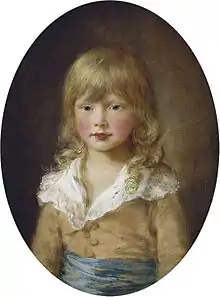Prince Octavius of Great Britain
Prince Octavius (23 February 1779 – 3 May 1783) was the thirteenth child and eighth son of King George III and his queen consort, Charlotte of Mecklenburg-Strelitz. Six months after the death of his brother Prince Alfred, Octavius was inoculated with the smallpox virus. Several days later, he became ill. His subsequent death at the age of four devastated his parents, and in particular his father. King George III was very fond of his two youngest sons, Alfred and Octavius, and his later bouts of madness would involve hallucinations of his dead sons. The king's eldest son, George IV, later served as regent for his mentally ill father.
| Prince Octavius | |
|---|---|
 Portrait by Benjamin West, 1783 | |
| Born | 23 February 1779 Buckingham House, London, England |
| Died | 3 May 1783 (aged 4) Kew Palace, Kew, England |
| Burial | 10 May 1783 |
| House | Hanover |
| Father | George III of the United Kingdom |
| Mother | Charlotte of Mecklenburg-Strelitz |
Life

Prince Octavius was born on 23 February 1779, at Buckingham House, London, England.[1] He was the thirteenth child and eighth son of King George III and his queen consort Charlotte of Mecklenburg-Strelitz. The prince's name derives from Latin octavus, "eighth", indicating that he was the eighth son of his parents.[2] The House of Lords sent congratulations to the King on his birth.[3]
Octavius was christened on 23 March 1779, in the Great Council Chamber at St James's Palace, by Frederick Cornwallis, The Archbishop of Canterbury. His godparents were The Duke of Brunswick-Wolfenbüttel (husband of his first cousin twice-removed, for whom The Earl of Hertford, Lord Chamberlain, stood proxy); The Duke of Mecklenburg (his first cousin once-removed, for whom The Earl of Ashburnham, Groom of the Stole, stood proxy); and The Duchess of Saxe-Weimar-Eisenach (wife of his sixth cousin, for whom Alicia Wyndham, Countess of Egremont and Lady of the Bedchamber to Queen Charlotte, was proxy).[4][5]
King George was extremely devoted to Octavius, who was too young to cause the kinds of trouble that his elder brothers were by the year of his birth. The king was affectionate[6] and indulgent with his young children, and strove to attend their birthday parties and other events organized for their merriment; on one occasion a friend witnessed a happy domestic scene that involved George "carrying about in his arms by turns Sophia and the last prince, Octavius."[7] Another witness wrote George and Charlotte "have their children always playing about them the whole time"; during most evenings the children were brought to their parents between 6 and 7 o'clock to play for an hour or two.[8] The king also was kept informed of his children's educational progress.[9]
Octavius was close to his nearest sister Sophia, who called Octavius "her son",[10] and went with her and their siblings, Elizabeth and Edward to Eastborne on the Sussex coast, where he could take in the fresh seaside air during the summer of 1780.[11] When he was nineteen months old, Octavius became an older brother with the birth of his younger brother Prince Alfred. Octavius was three years of age when Alfred died on 20 August 1782, and he again became the youngest surviving child.[12] Horace Walpole wrote to Sir Horace Mann that upon Prince Alfred's death, King George had declared "I am very sorry for Alfred; but had it been Octavius, I should have died too."[13] In 1820, historian Edward Holt would write of the prince's character, "Though Prince Octavius had not passed his fifth year, he was considered very docile, and possessed good-nature in such an uncommon degree, that he was the delight of all about him."[14] Biographer John Watkins added Octavius was "reckoned one of the finest of the royal progeny."[15]
Death and aftermath

Six months after Alfred's death, Octavius and Sophia were taken to Kew Palace in London to be inoculated with the smallpox virus.[14][16] While Sophia recovered without incident,[17][18] Octavius became ill and died several days later, on 3 May 1783 at around 8 o'clock in the evening.[19] He was four years old.[1][20] As was traditional, the household did not go into mourning for the deaths of royal children under the age of fourteen.[21]
Octavius has the distinction of being the last member of the British royal family to suffer from smallpox.[16][22] On 10 May, he was buried alongside his brother Alfred at Westminster Abbey.[14] Their eldest brother, when King George IV, ordered their remains transferred to St. George's Chapel, Windsor Castle on 11 February 1820, at about 3 o'clock.[1][23]
According to Queen Charlotte, Octavius's death was unexpected; she wrote to a friend who faced a similar tragedy that "twice have I felt what you do feel, the last time without the least preparation for such a stroke, for in less than eight and forty hours was my son Octavius, in perfect health, sick and struck with death immediately."[24] The prince's death had a marked effect, both mentally and physically on Queen Charlotte, who at the time was pregnant with her youngest child, Princess Amelia.[25]
Octavius's death devastated his father;[26] Walpole wrote "the King has lost another little child; a lovely boy, they say, of whom their Majesties were dotingly fond."[13] Shortly afterward, King George said "There will be no Heaven for me if Octavius is not there."[6][9] The day after his son's death, the King passed through a room where artist Thomas Gainsborough was completing the finishing touches on a portrait of the family. The King asked him to stop, but when he found out that the painting was of Octavius, allowed the painter to continue. When this same painting was exhibited a week later, Octavius's sisters were so upset that they broke down and cried in front of everyone.[20] Three months after Octavius's death, his father was still dwelling on his son, writing to Lord Dartmouth that every day "increases the chasm I feel for want of that beloved object [Octavius]."[9] In later years, King George imagined conversations with his two youngest sons.[26] During one of the king's bouts of madness in 1788, George mistook a pillow for Octavius, who by that time had been dead for five years.[27]
Titles and styles
- 23 February 1779 – 3 May 1783: His Royal Highness The Prince Octavius
Ancestry
References
Notes
- Weir 2008, p. 300.
- Watkins 1819, p. 270.
- "House of Lords Journal Volume 35: February 1779 21-30 Pages 583-599 Journal of the House of Lords Volume 35, 1776-1779. Originally published by His Majesty's Stationery Office, London, 1767-1830". British History Online. Retrieved 19 August 2020.
- Sheppard 1894, p. 59.
- Sinclair 1912, p. 102.
- Cannon 2004.
- Hibbert 2000, p. 98.
- Hibbert 2000, pp. 98–99.
- Hibbert 2000, p. 99.
- Fraser 2004, p. 70.
- Fraser 2004, pp. 65–66.
- Fraser 2004, pp. 65, 70, 76-79.
- Walpole & Cunningham 1891, p. 363.
- Holt 1820, p. 256.
- Watkins 1819, p. 291.
- Panton 2011, p. 359.
- Baxby 1984, p. 303.
- Papendiek 1887, p. 270.
- "No. 12437". The London Gazette. 3–6 May 1783. p. 1.
- Fraser 2004, p. 77.
- Fritz 1982, p. 305.
- Carrell 2003, p. 392.
- "Royal Burials in the Chapel since 1805". College of St. George. Archived from the original on 27 September 2011. Retrieved 30 August 2011.
- Baxby 1984, p. 304.
- Watkins 1819, p. 292.
- Black 2006, p. 156.
- Hibbert 2000, p. 280.
- Genealogie ascendante jusqu'au quatrieme degre inclusivement de tous les Rois et Princes de maisons souveraines de l'Europe actuellement vivans [Genealogy up to the fourth degree inclusive of all the Kings and Princes of sovereign houses of Europe currently living] (in French). Bourdeaux: Frederic Guillaume Birnstiel. 1768. p. 5.
Bibliography
- Baxby, Derrick (1984). "A Death From Inoculated Smallpox in the English Royal Family". Medical History. 28 (3): 303–307. doi:10.1017/s0025727300035961. PMC 1139449. PMID 6390027.
- Black, Jeremy (2006). George III: America's Last King. Yale University Press. ISBN 0-300-11732-9.
- Cannon, John (2004). "George III (1738–1820)". Oxford Dictionary of National Biography (online ed.). Oxford University Press. doi:10.1093/ref:odnb/10540. Retrieved 30 August 2011. (Subscription or UK public library membership required.) (subscription required)
- Carrell, Jennifer (2003). The Speckled Monster: A Historical Tale of Battling Smallpox. New York: Penguin Group. ISBN 0-452-28507-0.
- Fraser, Flora (2004). Princesses: The Six Daughters of George III. London: John Murray. ISBN 0-7195-6109-4.
- Fritz, Paul S. (1982). "The Trade in Death: The Royal Funerals in England, 1685-1830". Eighteenth-Century Studies. 15 (3): 291–316. doi:10.2307/2738157. JSTOR 2738157.
- Hibbert, Christopher (2000). George III: A Personal History. Basic Books. ISBN 0-465-02724-5.
- Holt, Edward (1820). The public and domestic life of His late Most Gracious Majesty, George the Third, Volume 1. London: Sherwood, Neely, and Jones.
- Panton, Kenneth J. (2011). Historical Dictionary of the British Monarchy. Scarebrow Press, Inc. ISBN 978-0-8108-5779-7.
- Papendiek, Charlotte (1887). Court and private life in the time of Queen Charlotte: Being the Journals of Mrs. Papendiek, Assistant Keeper of the Wardrobe and Reader to Her Majesty, Volume 1. London: Spottiswoode and Co. ISBN 1-143-96208-7.
- Sheppard, Edgar (1894). Memorials of St James's Palace. London: Longmans, Green, and Co.
- Sinclair, William (1912). The Chapels Royal. London: Eveleigh Nash.
- Walpole, Horace; Cunningham, Peter (1891). The letters of Horace Walpole, fourth earl of Orford, Volume VIII. London: Richard Bentley and Son.
- Watkins, John (1819). Memoirs of Her most excellent Majesty Sophia-Charlotte: Queen of Great Britain, Volume 1. London: Henry Colburn.
- Weir, Alison (2008). Britain's Royal Families, The Complete Genealogy. London: Vintage Books. ISBN 978-0-09-953973-5.
External links
 Media related to Prince Octavius of Great Britain at Wikimedia Commons
Media related to Prince Octavius of Great Britain at Wikimedia Commons